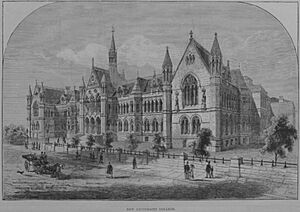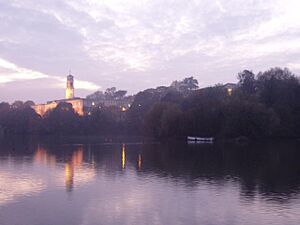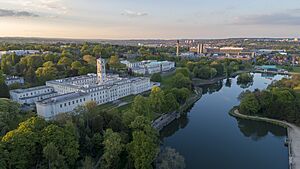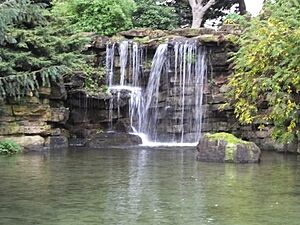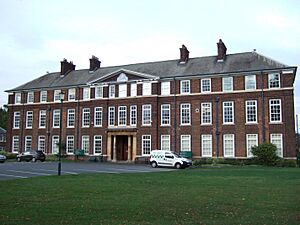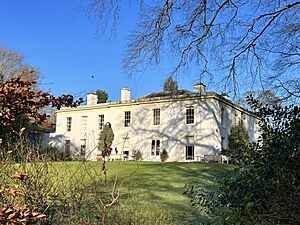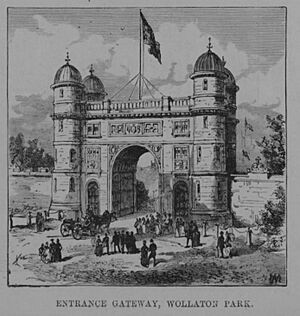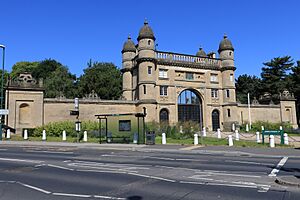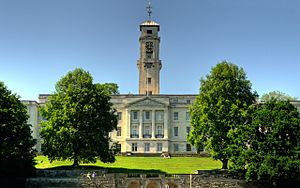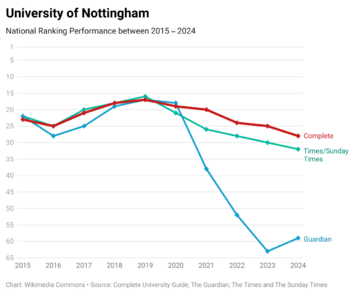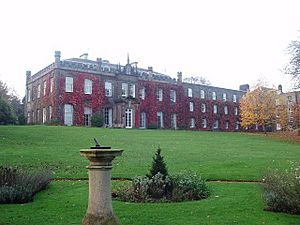University of Nottingham facts for kids

Coat of arms of the University of Nottingham
|
|
| Motto | Latin: Sapientia urbs conditur |
|---|---|
|
Motto in English
|
A city is built on wisdom |
| Type | Public |
| Established | 1798 – As an Adult Education School 1881 – University College Nottingham 1948 – Received royal charter |
| Endowment | £72.5 million (2023) |
| Budget | £811.2 million (2022/23) |
| Chancellor | Lola Young, Baroness Young of Hornsey |
| Vice-Chancellor | Shearer West |
| Visitor | Penny Mordaunt (as Lord President of the Council ex officio) |
|
Academic staff
|
3,540 Nottingham based (2021/22) |
| Students | 37,260 Nottingham based (2021/22) 47,532 worldwide (2019/20) |
| Undergraduates | 28,690 (2021/22) |
| Postgraduates | 8,570 (2021/22) |
| Location |
,
England
52°56′20″N 1°11′49″W / 52.939°N 1.197°W |
| Students' Union | University of Nottingham Students' Union |
| Colours | Nottingham Blue |
| Affiliations |
|
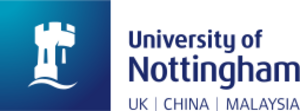 |
|
The University of Nottingham is a public research university in Nottingham, England. It was founded as University College Nottingham in 1881, and was granted a royal charter in 1948.
Nottingham's main campus (University Park) with Jubilee Campus and teaching hospital (Queen's Medical Centre) are located within the City of Nottingham, with a number of smaller campuses and sites elsewhere in Nottinghamshire and Derbyshire. Outside the UK, the university has campuses in Semenyih, Malaysia, and Ningbo, China. Nottingham is organised into five constituent faculties, within which there are more than 50 schools, departments, institutes and research centres. Nottingham has more than 46,000 students and 7,000 staff across the UK, China and Malaysia and had an income of £811.2 million in 2022–23, of which £129.5 million was from research grants and contracts.
The institution's alumni have been awarded one Nobel Prize, a Fields Medal, and a Gabor Medal and Prize. The university is a member of the Association of Commonwealth Universities, the European University Association, the Russell Group, Universitas 21, Universities UK, the Virgo Consortium, and participates in the Sutton Trust Summer School programme as a member of the Sutton 30.
Contents
History
Founding
The University of Nottingham traces its origins to both the founding of an adult education school in 1798, and the University Extension Lectures inaugurated by the University of Cambridge in 1873—the first of their kind in the country. However, the foundation of the university is generally regarded as being the establishment of University College Nottingham, in 1881 as a college preparing students for examinations of the University of London.
In 1875, an anonymous donor provided £10,000 to establish the work of the Adult Education School and Cambridge Extension Lectures on a permanent basis, and the Corporation of Nottingham agreed to erect and maintain a building for this purpose and to provide funds to supply the instruction.
The foundation stone of the college was duly laid in 1877 by the former Prime Minister William Ewart Gladstone, and the college's neo-gothic building on Shakespeare Street was formally opened in 1881 by Prince Leopold, Duke of Albany. In 1881, there were four professors – of Literature, Physics, Chemistry and Natural Science. New departments and chairs quickly followed: Engineering in 1884, Classics combined with Philosophy in 1893, French in 1897 and Education in 1905; in 1905 the combined Department of Physics and Mathematics became two separate entities; in 1911 Departments of English and Mining were created, in 1912, Economics, and Geology combined with Geography; History in 1914, Adult Education in 1923 and Pharmacy in 1925.
Development
The university college underwent significant expansion in the 1920s, when it moved from the centre of Nottingham to a large campus on the city's outskirts. The new campus, called University Park, was completed in 1928, and financed by an endowment fund, public contributions, and the generosity of Sir Jesse Boot (later Lord Trent) who presented 35 acres (14 ha) to the City of Nottingham in 1921. Boot and his fellow benefactors sought to establish an "elite seat of learning" committed to widening participation, and hoped that the move would solve the problems facing University College Nottingham, in its restricted building on Shakespeare Street. Boot stipulated that, whilst part of the Highfields site, lying south-west of the city, should be devoted to the University College, the rest should provide a place of recreation for the residents of the city, and, by the end of the decade, the landscaping of the lake and public park adjoining University Boulevard was completed. The original University College building on Shakespeare Street in central Nottingham, known as the Arkwright Building, now forms part of Nottingham Trent University's City Campus.
University College Nottingham was initially accommodated within the Trent Building, an imposing white limestone structure with a distinctive clock tower, designed by Morley Horder, and formally opened by King George V on 10 July 1928. During this period of development, Nottingham attracted high-profile lecturers, including Albert Einstein, H. G. Wells, and Mahatma Gandhi. The blackboard used by Einstein during his time at Nottingham is still on display in the Physics department.
Apart from its physical transfer to surroundings that could not be more different from its original home, the college made few developments between the wars. The Department of Slavonic Languages (later Slavonic Studies) was established in 1933, the teaching of Russian having been introduced in 1916. In 1933–34, the Departments of Electrical Engineering, Zoology and Geography, which had been combined with other subjects, were made independent; and in 1938 a supplemental Charter provided for a much wider representation on the Governing Body. However, further advances were delayed by the outbreak of war in 1939.
University status
University College Nottingham students received their degrees from the University of London. However, in 1943, the university was granted its royal charter which endowed it with university status and gave it the power to confer degrees. In 1948 University College Nottingham was incorporated as the University of Nottingham.
In the 1940s, the Midlands Agricultural and Dairy College at Sutton Bonington merged with the university as the School of Agriculture, and in 1956 the Portland Building was completed to complement the Trent Building. In 1970, the university established the UK's first new medical school of the 20th century.
In 1999, Jubilee Campus was opened on the former site of the Raleigh Bicycle Company, one mile (1.6 km) away from the University Park Campus. Nottingham then began to expand overseas, opening campuses in Malaysia and in China in 1999 and 2004 respectively. In 2005, the King's Meadow Campus opened near University Park.
The university has used several logos throughout its history, beginning with its coat of arms. Later, Nottingham adopted a simpler logo, in which a stylised version of Nottingham Castle was surrounded by the text "The University of Nottingham". In 2001 Nottingham undertook a major re-branding exercise, which included replacing the logo with the current one.
Campuses
UK campuses
University Park Campus
University Park Campus, to the west of Nottingham city centre, is the 330-acre (1.3 km2) main campus of the University of Nottingham. Set around its lake and clock-tower and with extensive parkland greenery, University Park has won numerous awards for its architecture and landscaping, and has been named the greenest campus in the country in a Green Flag Award.
At the south entrance to the main campus, in Highfields Park, lies the Lakeside Arts Centre, the university's public arts facility and performance space. The D.H. Lawrence Pavilion houses a range of cultural facilities, including a 225 capacity theatre space, a series of craft cabinets, the Weston Gallery (which displays the university's manuscript collection), the Wallner gallery, which exists as a platform for local and regional artists, and a series of visual arts, performance and hospitality spaces. Other nearby facilities include the Djanogly Art Gallery, Recital Hall and Theatre, which in the past have hosted recordings and broadcasts by BBC Radio 3, local community theatre partnerships, contemporary art exhibitions, and cultural festivals.
Jubilee Campus
Jubilee Campus, designed by Sir Michael Hopkins, was opened by Queen Elizabeth II in 1999, and is approximately 1 mile (1.6 km) from University Park. The campus' facilities house the Schools of Education and Computer Science, and The Nottingham University Business School. The site is also the home of The National College for School Leadership. Additional investment of £9.2 million in Jubilee Campus was completed in 2004, with a second building for Nottingham University Business School opened by Lord Sainsbury. The environmentally friendly nature of the campus and its buildings have been a factor in the awards that it has received, including the Millennium Marque Award for Environmental Excellence, the British Construction Industry Building Project of the Year, the RIBA Journal Sustainability Award, and the Civic Trust Award for Sustainability.
The Jubilee Campus won the commendation of the Energy Globe Award judges in 2005. The campus is distinct for its modern and unique architecture, culminating in Aspire, a 60-metre tall artistic structure is the tallest freestanding structure in the UK. The university plans to invest £200 million in a new scheme designed by Ken Shuttleworth, designer of the London 'Gherkin' and founder of Make Architects. However, the architecture of the Jubilee Campus is not admired by all, and the newly completed Amenities Building and YANG Fujia Building have been labelled the second worst new architectural design in Britain in a survey.
A fire in September 2014 destroyed the GlaxoSmithKline building which was under construction, but it was rebuilt and officially opened in 2017.
Other campuses
The City Hospital Campus houses staff and postgraduate students specialising in respiratory medicine, stroke medicine, oncology, physiotherapy, and public health. The campus was expanded in 2009 to house a new institute of public health and a specialist centre for tobacco research.
Sutton Bonington Campus houses Nottingham's School of Biosciences and the new School of Veterinary Medicine and Science, and is about 12 miles (19.3 km) to the south of the City of Nottingham, between the M1 motorway, Ratcliffe Power Station, and the Midland Main Line railway. The campus is centred on the historic manor of Sutton Bonington and retains many of its own botanic gardens and lakes. The University Farm, including the Dairy Centre, is at the Sutton Bonington Campus.
King's Meadow Campus was established in 2005 on the former Central Independent Television Studios site on Lenton Lane. It mainly accommodates administrative functions, but also the Department of Manuscripts and Special Collections. A functioning television studio remains at the site, that continues to be rented to the film and television industry.
Castle Meadow Campus is a 3.75-hectare site below Nottingham Castle, purchased by the university in 2021, having been previously owned by HMRC (HM Revenue and Customs). Existing buildings are to be refurbished with the campus planned to open from 2023.
International campuses
Nottingham has introduced overseas campuses as part of a growth strategy. The first stage in this strategy was the establishment in 1999 of a campus in Semenyih, Selangor, Malaysia, a short distance from Kuala Lumpur. This was followed in 2004 by a campus in Ningbo, Zhejiang Province, China.
The Malaysia campus was the first campus of a British university in Malaysia and one of the first anywhere in the world, earning the Queen's Award for Enterprise 2001 and the Queen's Award for Industry (International Trade) 2006. In September 2005, the Malaysia campus moved to a purpose-built campus at Semenyih, 18 miles (29.0 km) south of Kuala Lumpur city centre.
The £40 million Ningbo campus was completed in 2005, and was officially opened by John Prescott, the UK's Deputy Prime Minister, in February 2006. Like the Malaysia Campus, Ningbo Campus builds on the University Park in the UK and includes a lake, its own version of Nottingham's famous Trent Building, and the Centre for Sustainable Energy Technologies (CSET), China's first zero-carbon building.
In November 2012, the university launched a new joint venture in collaboration with the East China University of Science and Technology: the Shanghai Nottingham Advanced Academy (SNAA). The SNAA will deliver joint courses in Shanghai including periods of study in Nottingham, with teaching and research at undergraduate, postgraduate, and doctoral levels.
Organisation
Faculties and departments
The university is made up of a number of schools and departments organised into five faculties: Arts, Engineering, Medicine and Health Sciences, Science, and Social Science. Each faculty encompasses a number of schools and departments.
- Faculty of Arts
- American and Canadian Studies
- Classics and Archaeology
- Culture, Film and Media
- Cultures, Languages and Area Studies
- English
- French and Francophone Studies
- German Studies
- History
- History of Art
- Humanities
- Language Centre
- Music
- Philosophy
- Russian and Slavonic Studies
- Spanish, Portuguese and Latin American Studies
- Theology and Religious Studies
- Faculty of Engineering
- Architecture and Built Environment
- Chemical and Environmental Engineering
- Civil Engineering
- Foundation Engineering and Physical Sciences
- Electrical and Electronic Engineering
- Mechanical, Materials and Manufacturing Engineering
- Faculty of Medicine and Health Sciences
- Health Sciences
- Life Sciences
- Medicine
- Veterinary Medicine and Science
- Faculty of Science
- Biosciences
- Plant Science
- Chemistry
- Computer Science
- Mathematical Sciences
- Pharmacy
- Physics and Astronomy
- Psychology
- Faculty of Social Sciences
- Economics
- Education
- Geography
- Law
- Nottingham University Business School
- Politics and International Relations
- Sociology and Social Policy
Governance
The chief officer is the Chancellor, elected by the University Court on the recommendation of the University Council. The chief academic and administrative officer is the Vice-Chancellor, who is assisted by Pro-Vice-Chancellors. The governing body is the University Council, which has 35 members and is mostly non-academic. The academic authority is the Senate, consisting of senior academics and elected staff and student representatives. The largest forum is the University Court, presided over by the Chancellor.
The office of Chancellor is occupied by Lola Young, Baroness Young of Hornsey, following the retirement of Sir Andrew Witty. Witty, who became incumbent on 1 January 2013, announced his retirement in November 2017. He succeeded Yang Fujia, who had been installed in July 2001.
The current Registrar is Paul Greatrix.
Vice-Chancellors
The following have served as Vice-Chancellor of the university:
- 1948–1965: Bertrand Hallward
- 1965–1970: Frederick Dainton
- 1971–1975: John Butterfield
- 1976–1988: Basil Weedon
- 1988–2008: Sir Colin Campbell
- 2008–2017: Sir David Greenaway
- 2017–present: Shearer West
Academic profile
Academics
Nottingham is a research-led institution, and two academics connected with the university were awarded Nobel Prizes in 2003. Clive Granger was jointly awarded the Nobel Prize in Economics. Much of the work on Magnetic Resonance Imaging (MRI) was carried out at Nottingham, work for which Sir Peter Mansfield received the Nobel Prize for Medicine in 2003. Nottingham remains a strong centre for research into MRI. The university has contributed to a number of other significant scientific advances. Frederick Kipping, professor of chemistry (1897–1936), made the discovery of silicone polymers at Nottingham. Major developments in the in vitro culture of plants and micropropogation techniques were made by plant scientists at Nottingham, along with the first production of transgenic tomatoes by Don Grierson in the 1980s. Other innovations at the university include cochlear implants for deaf children and the brace-for-impact position used in aircraft. In 2015, the Assemble collective, of which the part-time Architecture Department tutor Joseph Halligan is a member, won the Turner Prize, Europe's most prestigious art award. Other facilities at Nottingham include a 46 teraflop supercomputer.
Nottingham was ranked joint 23rd in the UK amongst multi-faculty institutions for the quality (GPA) of its research and 8th for its Research Power in the 2014 Research Excellence Framework. More than 80 per cent of research at the university was described as "world-leading" or "internationally excellent" in the UK Funding Councils' 2014 Research Excellence Framework, with 28 out of 32 returns having at least 75 per cent of impact that was either "outstanding" or "very considerable" – ranking the university 7th in the UK on this measure. Nottingham is also in the top seven universities in Britain for the amount of research income received, being awarded over £40 million in research contracts for the 2015–2016 academic year by UK Research Councils, and £159 million in total research awards income.
The university is home to the Leverhume Centre for Research on Globalisation and Economic Policy (GEP). GEP was established in the Nottingham School of Economics in 2001, and conducts research activities structured on the theme of globalisation.
Admissions
|
| Domicile and Ethnicity | Total | ||
|---|---|---|---|
| British White | 54% |
|
|
| British Ethnic Minorities | 23% |
|
|
| International EU | 3% |
|
|
| International Non-EU | 20% |
|
|
| Undergraduate Widening Participation Indicators | |||
| Female | 54% |
|
|
| Private School | 20% |
|
|
| Low Participation Areas | 8% |
|
|
According to the latest statistics (2015/16) compiled by the Higher Education Statistics Agency, Nottingham is the UK's sixth largest university based on total student enrolment with 32,125 students; from more than 130 countries. 20% of Nottingham's undergraduates are privately educated, the 17th highest proportion among mainstream British universities. In the 2016–17 academic year, the university had a domicile breakdown of 78:5:17 of UK:EU:non-EU students respectively with a female to male ratio of 55:45.
The university gave offers of admission to 67.7% of its undergraduate applicants in 2022, the 50th lowest offer rate across the country. According to The Times and The Sunday Times League Table 2015, the university received 7.3 applications for every place available, placing it joint 14th in the UK (tied with Edinburgh Napier University) for the 'Most Competition for Places'. For the 2013–14 admissions cycle, the average successful applicant attained 426 UCAS points (the equivalent of ABB at A Level and BB at AS Level), ranking it as the 22nd highest amongst higher educational institutes.
Rankings and reputation
| National rankings | |
|---|---|
| Complete (2021) | 30 |
| Guardian (2021) | 59 |
| Times / Sunday Times (2021) | 32 |
| Global rankings | |
| ARWU (2020) | 101–150 |
| CWTS Leiden (2020) | 137 |
| QS (2021) |
108 |
| THE (2021) | 130= |
| British Government assessment | |
| Teaching Excellence Framework | Gold |
The university was named Times Higher Education "University of the Year" in 2006, Times Higher Education "Entrepreneurial University of the Year" in 2008, and finished runner up in the 2010 Sunday Times "University of the Year". In 2016–17, Nottingham was named 'University of the Year' for graduate employment by The Sunday Times. Nottingham is described by the Fulbright Commission as "one of the UK's oldest, largest, and most prestigious universities". In 2019, it ranked 126th among the universities around the world by SCImago Institutions Rankings.
In the 2021 Research Excellence Framework (REF), which assesses the quality of research in UK higher education institutions, Nottingham is ranked joint 25th by GPA and 7th for research power (the grade point average score of a university, multiplied by the full-time equivalent number of researchers submitted). The 2024 QS University Ranking placed Nottingham University 100th globally and 17th nationally.
Nottingham is ranked 2nd in the UK (after Oxford) and 13th in the world in terms of the number of alumni listed among CEOs of the 500 largest companies worldwide. The 2015 Global Employability University Ranking places Nottingham 78th in the world and 11th in the UK. In 2019, Nottingham was ranked Europe's 87nd 'Most Innovative University'.
Subject Rankings
2025 UK Complete University Guide: Subject League Tables
- #4 for Veterinary Medicine
- #6 for Chemical Engineering
- #7 for Aeronautical and Aerospace Engineering
- #7 for Education
- #7 for Pharmacology and Pharmacy
- #8 for Architecture
- #8 for Nursing and Midwifery
- #10 for Law
- #11 for Sports Science
- #11 for Theology and Religious Studies
- #12 for Economics
- #12 for Sociology
2024 Times Higher Education (THE) World University Rankings: By Subject
- #8 in the UK and #45 worldwide for Law
- #9 in the UK and #75 worldwide for Business & Economics
- #9 in the UK and #68 worldwide for Education
- #10 in the UK and #98 worldwide for Engineering
- #12 in the UK and #77 worldwide for Clinical & Health
- #14 in the UK and #95 worldwide for Psychology
Student life
Students' Union
The University of Nottingham Students' Union is heavily involved with providing student activities at the university and has more than 190 student societies affiliated to it. A further 76 clubs are affiliated to the Students' Union's Sports Committee. Nottingham participates yearly in the Varsity Series, a number of sporting events between the students and staff of the university and traditional rivals Nottingham Trent University.
The student newspaper Impact is published regularly during term time. The Students' Union radio station is University Radio Nottingham. A range of student theatre takes place at The New Theatre. The Students' Union also operates a student-run professional sound and lighting company, TEC PA & Lighting, who provide services for many events such as graduation, balls, and many other events, both within the university and to external clients.
The Students' Union also organises a number of activities and events involving students and staff with the local community. The Student Volunteer Centre sees more than 4500 students each year volunteering in local schools and community organisations, as well as a range of other projects throughout the city of Nottingham. The Union has the largest student-run RAG organisation outside of the US, "Karnival" (abbreviated to "Karni"), which raised £1.61 million in 2012. The Students' Union also runs an international volunteering project, InterVol, which sends student volunteers to work in rural African communities.
Karnival also ran "RAG raids", a format of charity fundraising in other cities, which proved to be one of the most profitable charity sources for the university with notably a single RAG raid in 2014 raising £66,552.72 for the Poppy Appeal. However, in April 2017 the raids were controversially banned by the students' union over the fears for the safety on students.
Halls of residence
The University of Nottingham has a system of halls located on its campus. The halls are generally named either after counties, districts, or places in the East Midlands or significant people associated with the university.
Sport
The David Ross Sports Village is a multi-sport facility, which opened in October 2016.
Notable people
-
D.H. Lawrence, novelist
-
Peter Mansfield, physicist who was awarded the 2003 Nobel Prize in Physiology or Medicine
-
Sir Ian Kershaw, historian, one of the world's leading experts on Adolf Hitler and the Third Reich
-
Sir Martyn Poliakoff, research professor in chemistry and known for his leading role in The Periodic Table of Videos
-
Sir Clive Granger, economist awarded the 2003 Nobel Memorial Prize in Economic Sciences
The university has been associated with a range of notable alumni and staff in a number of disciplines: Nobel prize or Fields medal winners; Sir Clive Granger – Nobel Prize in Economics, Sir Peter Mansfield – Nobel Prize in Physiology or Medicine for contributions to Magnetic Resonance Imaging, Andre Geim – Nobel Prize–winning physicist, and Caucher Birkar – Fields medal-winning mathematician.
Academics:
- Sir Arthur Elijah Trueman – geologist
- Milton Wainwright – microbiologist
- Sir Keith O'Nions – ex-president and rector of Imperial College London
- Jeremy Lawrance – professor of Spanish Golden Age studies
- Ivy Pinchbeck – economic and social historian of women
- Helen Willetts – meteorologist
- Sir Martyn Poliakoff – professor in chemistry and featured in Periodic Table of Videos
- Stewart Adams – contributor to the development of ibuprofen
- Sir Ian Kershaw – historian
- Sophie Harker – winner of IET's 2018 Young Women Engineer of the Year Award and the Sir Henry Royce Medal.
- Monica Partridge – in 1967 was the first woman at Nottingham to be made a professor
- Morley Muse - founder of iSTEM, and winner of 2022 Women's Agenda - Emerging Leader in STEM awards.
Arts and media:
- Emma Barnett – journalist, presenter of BBC Newsnight and Woman's Hour
- Andrew Grima – British jewellery designer
- Graham Dury – cartoonist
- Haydn Gwynne – actress
- D.H. Lawrence – writer
- John Peel – writer
- Ruth Wilson – actress
- Theo James – actor
- Clive Tyldesley – football commentator
Business:
- David Ross – co-founder of The Carphone Warehouse
- Kweku Adoboli – UBS rogue trader of "the biggest fraud in British history"
- Jonathan Browning – former president and CEO of Volkswagen Group of America
- Steve Holliday – former CEO of National Grid plc
- Tim Martin – founder and chairman of J D Wetherspoon
- Simon Nixon – billionaire businessman, co-founder of Moneysupermarket.com, dropped out
- John Rishton – former CEO of Rolls-Royce plc
- Richard Scudamore – CEO of the Premier League
- Sir Andrew Witty – former CEO of GlaxoSmithKline
- John Timpson – Chairman of Timpson
- Tan Sir Francis Yeoh (Honorary Doctor of Laws) – Managing Director of YTL Corp Berhad Group
- Ruth Yeoh – Executive Director of YTL Singapore
- Peter Rice – President of 21st Century Fox
Politics and public service:
- Tedros Adhanom – Director General of the World Health Organization
- Jonathan Van-Tam – Deputy Chief Medical Officer for England
- Wei Shen Lim KBE - MBBS (1991), Chair, Covid-19 Immunisation UK and cofounded the CURB-65 pneumonia severity assessment
- Najib Razak – former Prime Minister of Malaysia
- Sir John Sawers – former head of MI6
- Paul Dibb – Australian strategist and former Director of the Joint Intelligence Organisation
- Judith Gough - ambassador
- Theresa Tam – Canada's Chief Public Health Officer
- Azlan Shah of Perak – 9th Yang di-Pertuan Agong of Malaysia (King of Malaysia)
- Jaafar of Negeri Sembilan – 10th Yang di-Pertuan Agong of Malaysia (King of Malaysia)
- Kemebradikumo Pondei – acting managing director of Niger Delta Development Commission
- Jeremy Browne – former Minister of State for the Home Office
- Anthony Joseph Lloyd – former Mayor of Greater Manchester and MP
- Mazen Sinokrot – Minister of Economy, Palestinian Territories
- Michael Dugher – former Shadow Secretary of State for Culture, Media and Sport
- Ahmad Tavakkoli – Iranian politician
- Divya Maderna – Member of Legislative Assembly of Rajasthan
- Mikhail Svetov – Russian politician, one of the main ideologists and popularizers of libertarianism in Russia
- Dennis Tan – LLB (1994), Member of Parliament (Worker's Party), Singapore
Legal:
- Sir John Cyril Smith – criminal lawyer
- Sir Nigel Sweeney – High Court judge
- Punch Coomaraswamy – Supreme Court Judge (Singapore) and Ambassador of Singapore to the United States
See also
 In Spanish: Universidad de Nottingham para niños
In Spanish: Universidad de Nottingham para niños
- Academic dress of the University of Nottingham
- Armorial of UK universities
- China Policy Institute
- Institute of Contemporary Chinese Studies
- International Trade Awards (2007)
- List of modern universities in Europe (1801–1945)
- List of universities in the UK
- The George Green Institute for Electromagnetics Research



